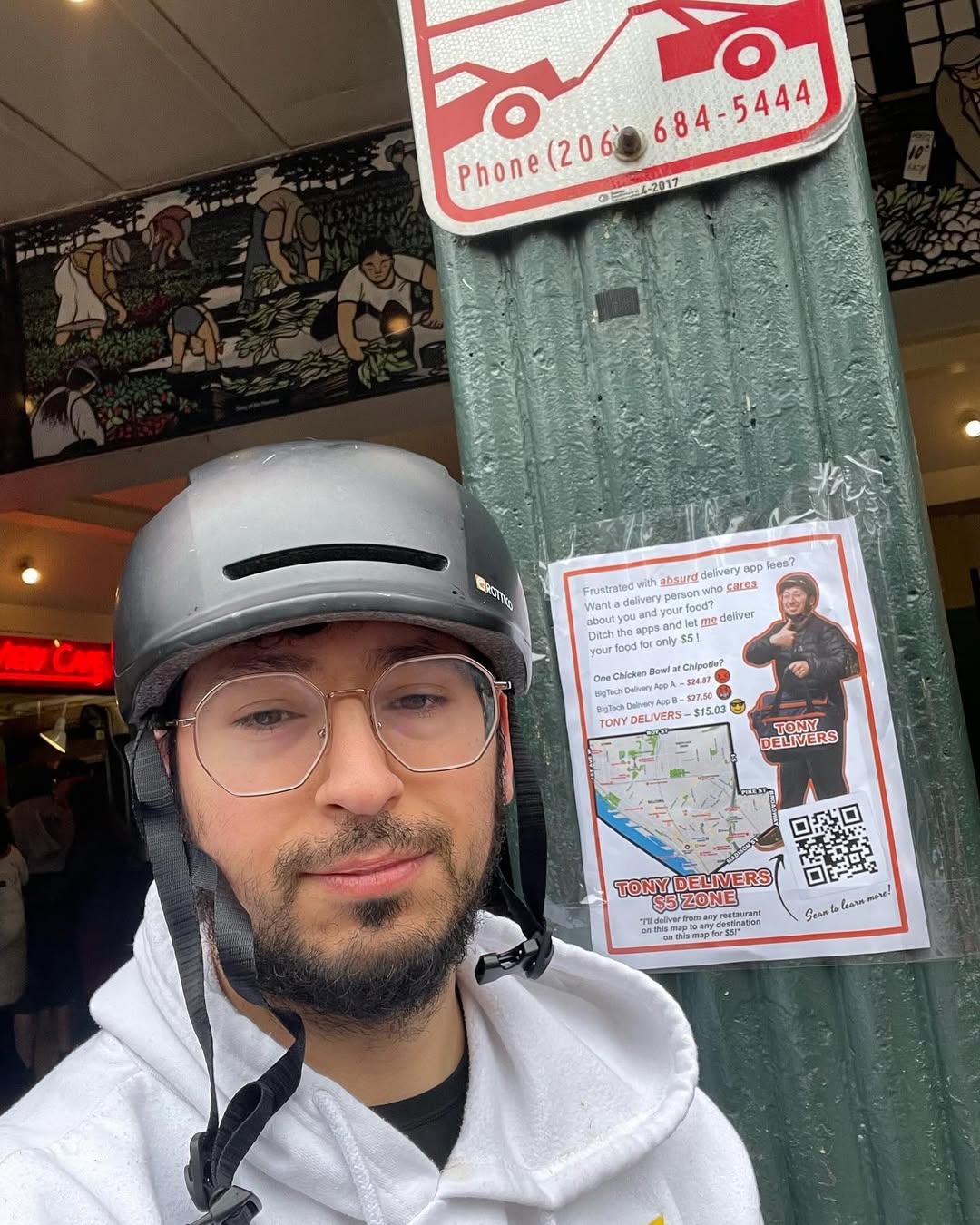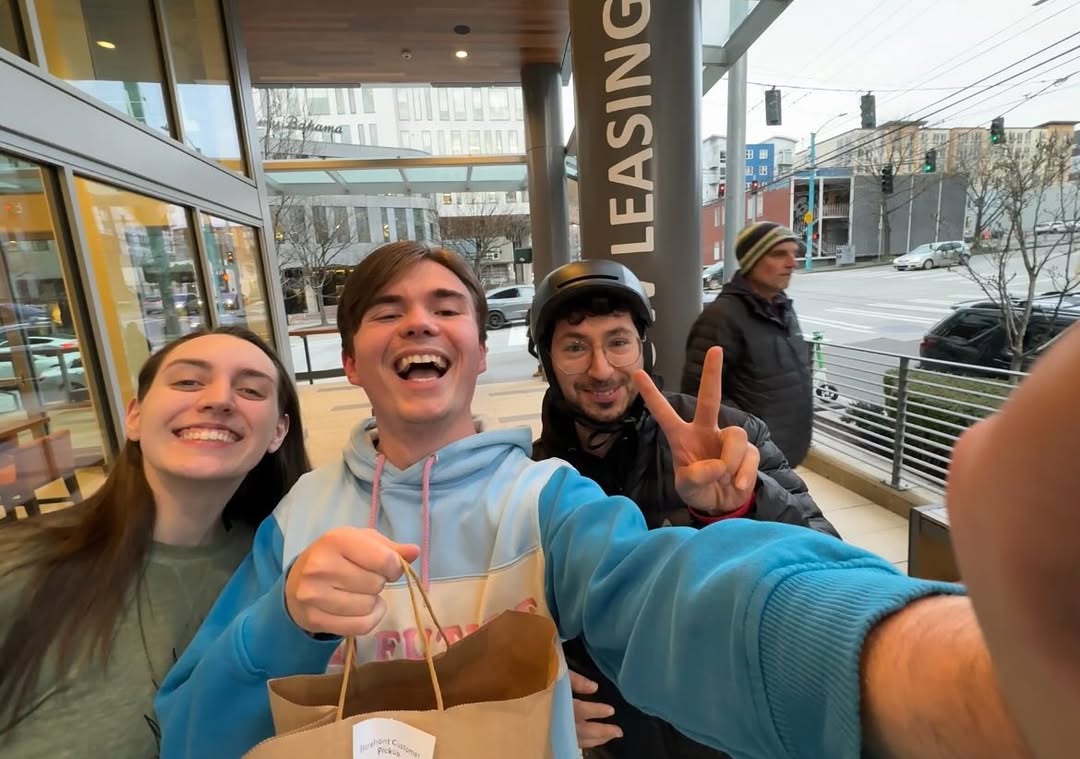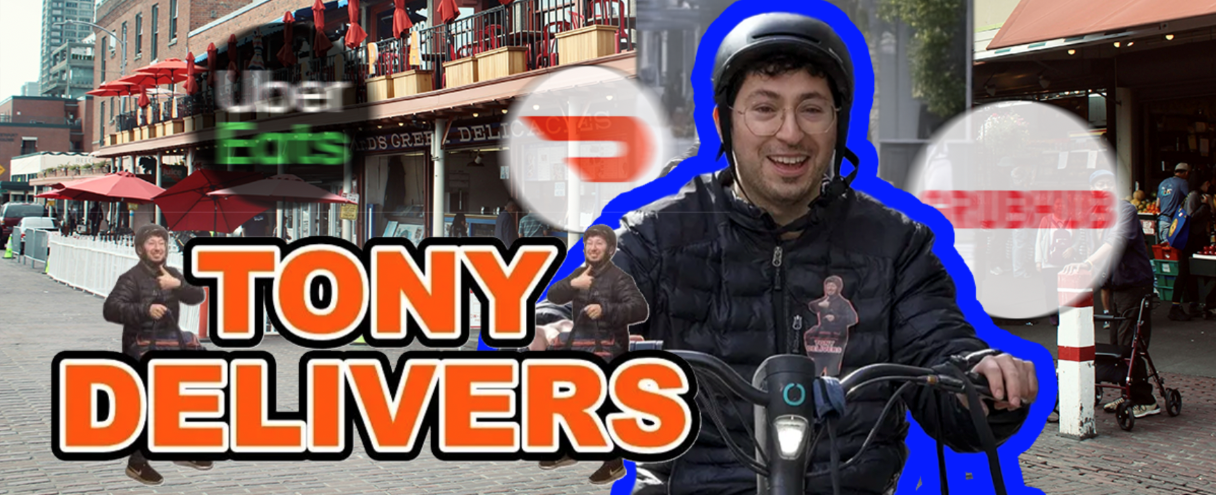After nearly five years behind the wheel with Uber, this founder saw first-hand what’s broken in the restaurant delivery world. He’s not just talking big, he’s got momentum: over 1,000 drivers waitlisted for their new delivery app and enough viral attention that even ex-marketing directors from the most popular marketplaces took notice.
Tony, you left a job as an Uber driver after about five years and jumped into founding your own delivery startup.
Take me back to the beginning – why start your own company?
Yeah, I was a driver for about five years. I always kind of wanted to do some sort of startup. I was trying to live out my founder dreams. The market changed in Seattle, and I saw an opportunity to pivot. I watched that YC video DoorDash put out about how they started in their dorm. Ironically, I delivered to someone who lived next door to their dorm at Stanford.
I was always just trying to start my own thing. And the way tech’s evolved, like advances in AI, it kind of propelled me to have a greater feedback loop and more certainty in my thinking.
Why do you think Tony Delivers caught so much attention?
Because it’s a driver taking initiative when the whole industry feels broken. It’s not just tech disruption for the sake of it. It’s about trying to rebalance an equation that’s become unfair. We’ve got over 1,000 drivers on the waitlist, and we're in the middle of raising capital. But we don’t want the funding to change our values. This has to stay focused on the workers and the restaurants. They are the market. Not the data scientists. Not the ad buyers. Them.

What's the biggest problem with platforms like DoorDash and Uber Eats?
They sell this idea that there's 'magic' behind the apps. But the truth is, it's middlemen. It’s just overhead, ads, and layers of inefficiency. You can go to our website right now and use the price calculator – compare the cost of DoorDash in your area. Or use the cost pro analyzer for restaurants and see what they actually lose. The numbers are staggering. DoorDash spent $2 billion last year on ads. We plan to spend zero, seriously. That’s our advantage.
Also, these companies still aren’t profitable, and instead of fixing the fundamentals, they throw money at advertising, data teams, A/B testing, and trying to engineer demand that just isn’t there. But this isn’t toothpaste. It’s food. People order when they’re hungry, not on some perfect schedule.
You might want a burrito on Friday and a pizza on Sunday, and then nothing for weeks. That’s normal.
“You can’t force people into being 'power users' of food delivery”.
If you took away all the promos and nudges, most people would order 3-4 times a month. And that’s fine. It would be slightly less efficient, sure, but also way cheaper. Like, 10 to 15% cheaper. That money could go back to drivers and restaurants, where it belongs.
The truth is, GrubHub and others claim to be “for restaurants,” but they’re not. They’re for themselves. And that’s not even me being bitter, that’s just how most companies work. But this is a four-sided marketplace: customers, restaurants, drivers, and platforms. And they’re running it like a one-sided business. It’s like trying to run a polyamorous relationship with monogamous rules. You just can’t.
The math just doesn’t work. I’m not out here obsessing over which burger place gets more orders on DoorDash. If one burger joint’s better, let it win, Darwin’s theory, right?
But these apps pitch themselves as “for the restaurant.” They’re for themselves, obviously. That’s capitalism, but restaurants, drivers, consumers… This is a four-sided marketplace, not one or two. You can’t use “monogamous” business advice for a “polyamorous” structure. You gotta make more parties happy, and these apps usually just don’t.
Can you actually compete financially with players like DoorDash or UberEats?
Tony: Absolutely. Our economics are lean. DoorDash drivers make around $7 to $7.50 per delivery. On Tony Delivers, we’re expecting drivers to make $9 to $11. That’s a real difference. No tricks. No hidden cuts. It's not like we're going to make DoorDash money, but we're, we're definitely going to earn some money along the way.
“We don’t need to be a billion-dollar company to make an impact”.
We just need to make enough to run sustainably and put more into the hands of the people who matter.
Because, you know, a modern economy requires modern economics. Ours is lean. If you're working at DoorDash, you're probably, on average, making about $7 to $7.50 per delivery. At Tony Delivers, I think it’s between $9 to $11. That's a huge difference for delivery, right?
You went so viral, and you were interviewed a lot. There is a thread about you on Reddit. You’ve been a guest on some podcasts. Did anyone from “big brothers” reach out?
One of the company’s former marketing directors reached out when we first announced we were launching. He said he thinks we’re going to win Seattle. That was like nine months ago, and I still believe the same market conditions exist.
We’re technically not live yet, because we need a better market and product fit. Part of that is understanding restaurant behavior, like how peak times work. People eat dinner at 6 or 7 p.m., not 3 p.m., so we need to figure out how to retain drivers during off-hours. For many, this is their main gig.
So we're also creating a grocery marketplace, a donation marketplace, and more. Maybe it’s a little bravado, but I think we’ll absolutely crush Instacart. They just can’t make precise moves like we can.
You know, I've already looked at our market conditions, and once we reach sufficient volume, we should be profitable instantly.

Before I forget: what about tipping? How do you handle it?
Tony: We don’t track tips. We’re not going to manipulate them. DoorDash stole driver tips. We’re not doing that. If a customer wants to tip in cash – fine. If they want to tip in-app – fine. But we don’t build a business on top of that. We’ll let drivers set their own pricing over time, they’ll know what price gives them too much volume or not enough. That’s real flexibility.
You’ve mentioned to me that you are in Thailand now. Tony Delivers website says that you are onboarding new users, not only in the US, but abroad. Are you going worldwide?
Seattle’s home base, but the buzz is international—Brooklyn, Houston, North Carolina, Finland, Japan, England, you name it. The issue is universal, not just Seattle. I like how Facebook grew: word-of-mouth, an S-curve. Everyone says, “Focus on one city.” But these problems are everywhere.
“If we crack it in Seattle, the rest will follow”.
And to be honest, restaurants and workers need their power back, this isn’t just tech, it’s about restoring economic mobility that’s gotten squeezed by super-efficient, hyper-scaled companies.
You really don’t plan huge ad campaigns like DoorDash?
We’re gonna spend basically zero on ads. Let’s cut the fluff and become the word-of-mouth champion.
I know this might sound a little egotistical, but I think that, as the founder, it provides value when you can go viral. I've spent a lot of time slowly, slowly streaming. When I get back from Thailand, that's kind of my main goal, just streaming the day-to-day, and creating this very transparent, open relationship with people.
With all the attention (even from insiders at big companies!), nobody’s tried to buy you out?
Nope, nobody. But I’ve talked for hours – literally four, maybe even six hours – with people who used to run things at these big companies. They’ll straight up say: ‘DoorDash’s lead isn’t safe. If you have 65% market share and people still think you’re vulnerable? That’s wild. You do the math on Tony Delivers: lower costs for customers, higher pay for workers, higher cut for restaurants. We’re talking $4 per meal saved, real money, not pennies. The market’s mature, but if workers and restaurants realize their own power, the whole thing shifts.
Would you ever sell if one of these giants came knocking?
Tony: No, I, I wouldn't. I wouldn't sell for two reasons. I think that, firstly, the growth potential is tremendous. I mean, it has a remarkable upside.
“And the other reason is that I believe the market needs someone to kind of just stand there and not sell.”
Will I make less money by not selling? Probably, yeah, that's, that's a definite. But I'm still going to make some money.
How many people are behind Tony Delivers?
Right now, it’s just me, my co-founder, and our engineer. We're looking forward to expanding when we raise money. Ideally, we’d raise a million and pay people right, something like 100K annually. My role will be a mix; media, strategy, and hands-on ops. But really, it’s about letting the product prove itself. Maybe eight people full-time next year, all well-compensated, all-in on the mission.
I can’t resist asking: Do you order food online?
When in the States, I don't order very often. But if I were to order food, I would choose Tony Delivers.
Editor’s Note: Tony’s a guy who speaks his mind, doesn’t polish his answers, while being very polite, and keeps the focus on the people – drivers, restaurant owners, regular folks – at the heart of the delivery game. Keep an eye out: you’ll likely hear his name (and his company’s) more before this David-vs-Goliath story is.




